small
Showing 49–60 of 106 results
-

Mahonia repens / creeping Oregon grape
- pinnately compound with toothed, holly-like leaflets
- clusters of yellow flowers in spring; blue berries in late summer
- low, creeping shrub
- evergreen - but winter leaves are reddish
-

Malva neglecta / cheeseweed
- leaves look like grocery store geraniums (Pelargonium)
- flowers are small, pink-ish and often buried in the foliage
- fruits are small (ca. 1/2 in) and round
-
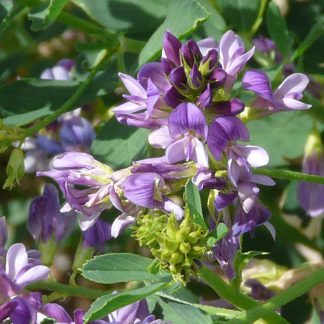
Medicago sativa / alfalfa
- escaped forage plant
- bright purple flowers in dense clusters
- pea-like flowers with broad upper petal, 2 small laterals, keel
- compound leaves with 3 leaflets, the central one extended on a short stalk
- disturbed sites - roadsides, full sun
-

Mertensia oblongifolia / sagebrush bluebell
- bright blue-to-purplish flowers, hanging and downward facing
- narrow tube that flares abruptly to bell
- blooms in very early spring, soon after snow-melt
- usually associated with sagebrush
-

Micranthes odontoloma / brook saxifrage
- streamsides (or in the streams) especially at higher elevations
- white petals with beautiful red center
- yellow/green spots on the petals
- multiple drooping flowers on foot-long, leafless stems
-
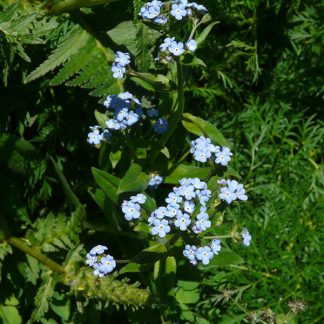
Myosotis asiatica / forget-me-not
- azure blue to violet to white flowers - very small
- yellow ring around the center of each flower, like a doughnut
- usually many flowers in an inflorescence
- flowers initially in compact clusters, more spread out later in season
- leaves and stems a bit hairy
-

Nasturtium officinale / watercress
- emergent aquatic in slow-ish flowing steams
- four petaled white flowers in clusters
- thick, shiny leaves
- often in dense colonies
-
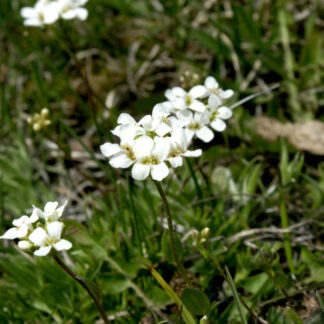
Noccea fendleri ssp. idahoensis / wild candytuft
- white crucifer, four petals in two parallel rows
- flowers in terminal clusters
- basal rosette leaves with a few on the stalks
- wetter areas
-
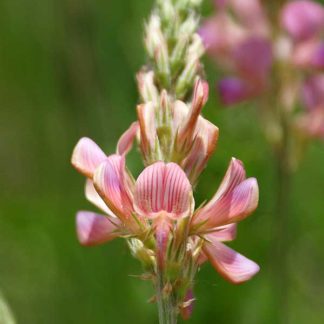
Onobrychis viciifolia / sainfoin
- forage legume, taller than alfalfa
- pink pea-like flowers with striped banner petal and darker keel
- spiky inflorescence (a raceme) blooming from bottom up - up to 50 flowers
- pinnately compound leaves with single terminal leaflet
- naturalized with sagebrush and mountain shrubs, but also in the central Valley
-

Oxytropis sericea / white-point vetch
- white "pea" flowers in clusters of up to 25
- banner petal white with purple/blue veins
- hairy, pinnately compound leaves, all basal
- disturbed areas, especially exposed to cold, drought, high light etc.
- pretty, but toxic to grazing animals
-
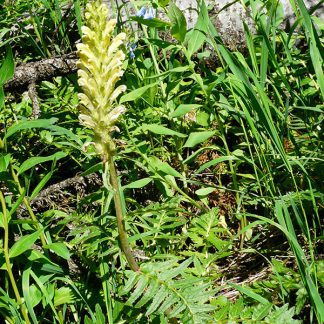
Pedicularis bracteosa / towering lousewort
- dense, narrow inflorescence on upper half of stem
- yellow, beak-like flowers with upper and lower lips
- flowers from bottom to top
- conspicuous, fern-like leaves
- old flowers become light brown but remain on stalk
-

Pedicularis groenlandica / elephant head
- flowers range from pink to purple or white
- flowers each have a long, pointed, upward curving beak like an elephant's trunk and lateral lobes that look like elephant's ears
- sharply-toothed fernlike leaves
- wet environments in late June, early July
Showing 49–60 of 106 results